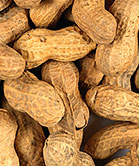
THURSDAY, May 13 (HealthDay News) — A new survey suggests that the percentage of children with peanut allergies has more than tripled in just over a decade, although the actual number of kids thought to have the allergy is still small.
“These results show that there is an alarming increase in peanut allergies, consistent with a general, although less dramatic, rise in food allergies among children in studies reported by the CDC [U.S. Centers for Disease Control and Prevention],” study leader Dr. Scott H. Sicherer, a professor of pediatrics at the Jaffe Food Allergy Institute at Mount Sinai School of Medicine, said in a news release from the school. “The data underscore the need for more study of these dangerous allergies.”
Researchers surveyed 5,300 households in 2008 and found that 1.4 percent of children were thought to have peanut allergies. That’s more than three times the rate — 0.4 percent — found in a similar survey that was done in 1997.
The percentage of kids with allergies to either peanuts or tree nuts grew to 2.1 percent in 2008 from 0.6 percent in 1997.
Among adults, the level of peanut allergies didn’t change: It remained at 1.3 percent.
“Our research shows that more than 3 million Americans report peanut and/or tree nut allergies, representing a significant health burden,” Sicherer said. “The data also emphasize the importance of developing better prevention and treatment strategies.”
It’s not clear why the number of reported allergies is on the rise. One theory suggests that people are developing less immunity to allergens because they’re exposed to fewer germs. Another suggests that people are wrongly diagnosed with food allergies that they don’t actually have.
The researchers caution that they only called homes with telephones, possibly skewing the results toward the experiences of wealthier households.
The findings appear in the May 12 issue of the Journal of Allergy and Clinical Immunology.
More information
For more on kids and food allergies, try the Children’s Hospital of Wisconsin.

